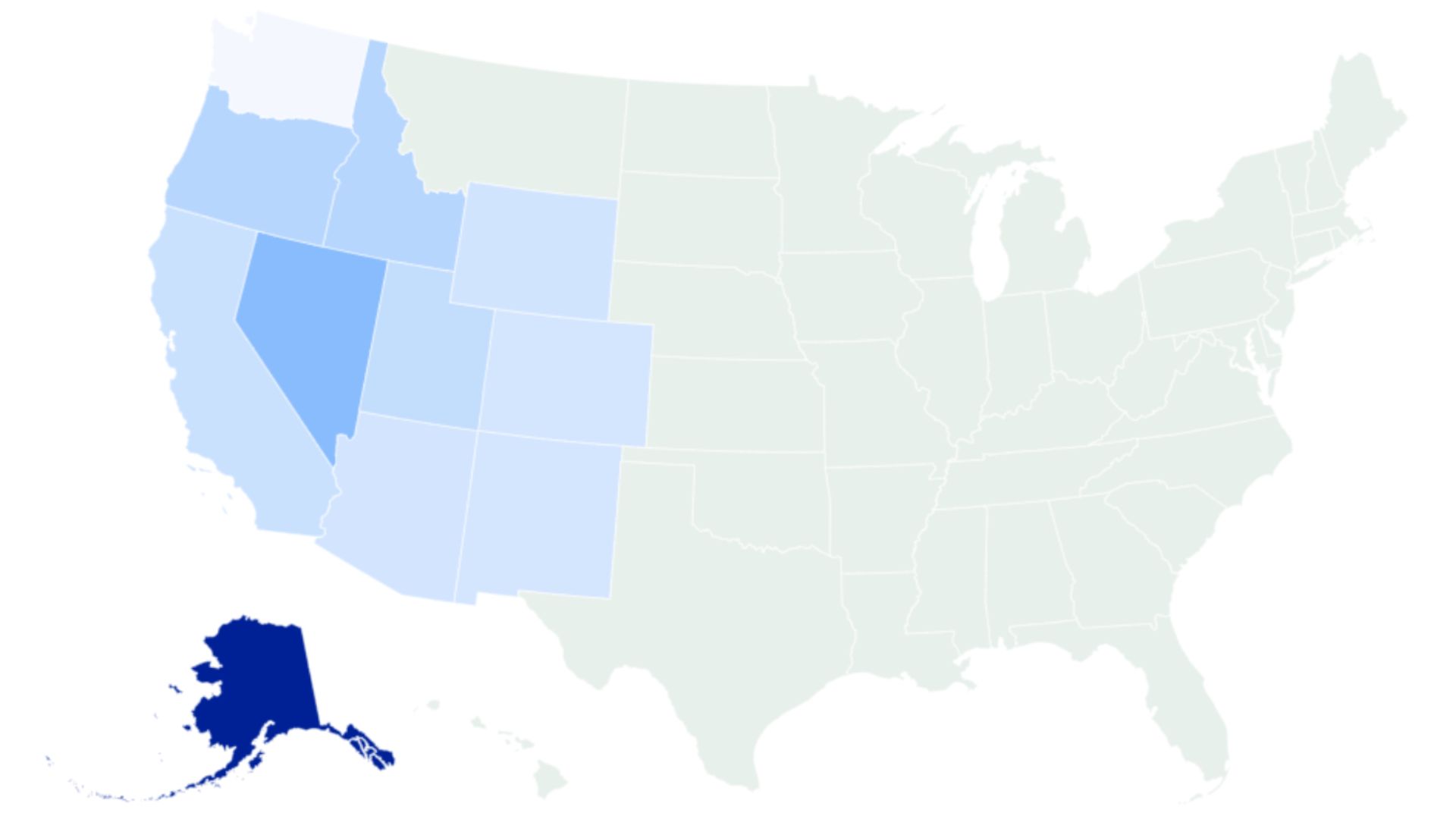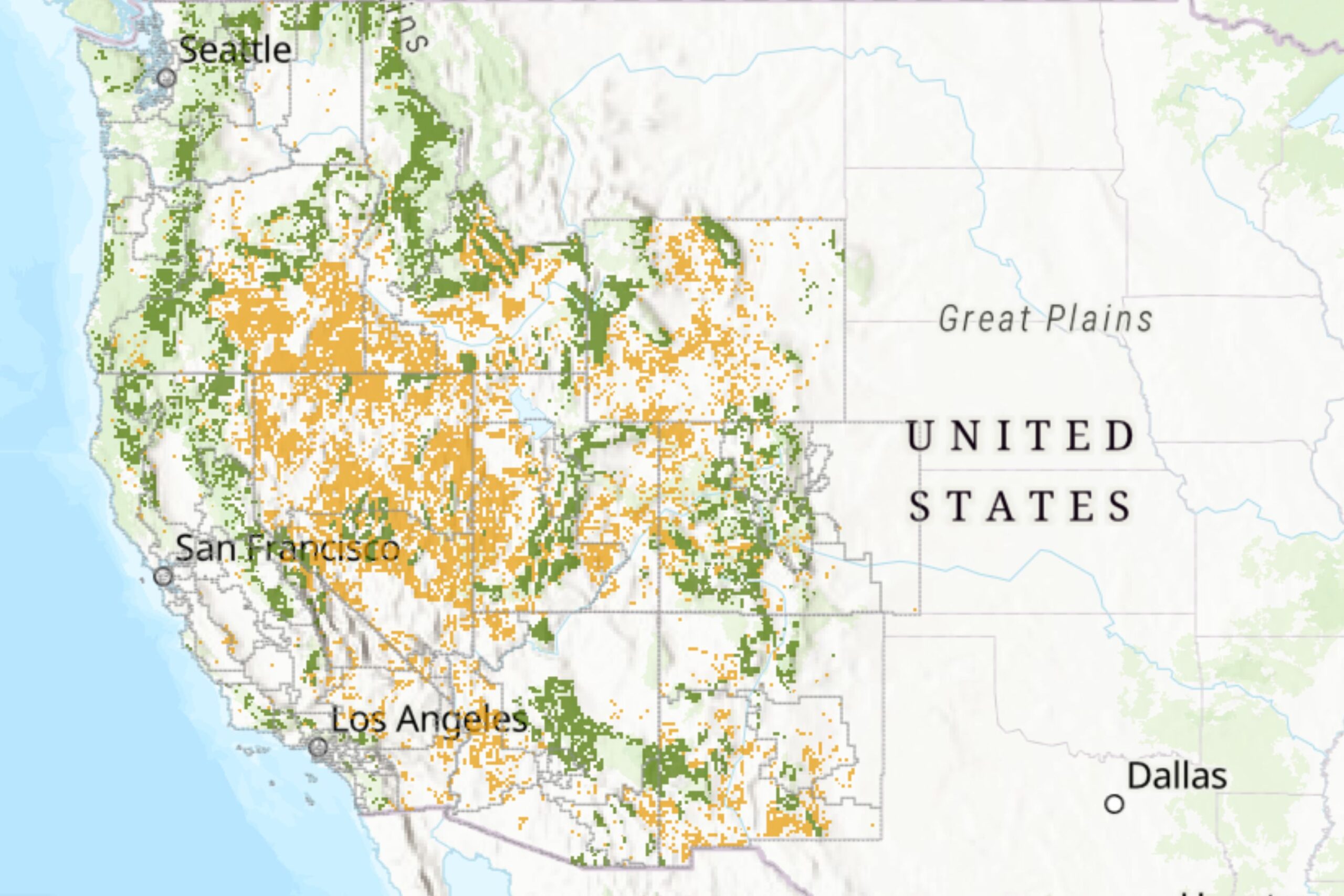
The largest single sale of national public land in modern history could be carried out as part of President Donald Trump‘s budget bill to help pay for his sweeping tax cuts.
However, a professor who is an expert on climate policy questioned the efficacy of the proposals, telling Newsweek that “selling off public lands will not reduce federal spending to any significant degree.”
Newsweek has contacted the Bureau of Land Management and the U.S. Forest Service via email for comment.
Why It Matters
The Senate committee said that a lot of the land owned by BLM and USFS cannot be used for housing, and so by opening up portions of federal land for large-scale housing construction, they intend to solve the “housing crisis.”
However, the nonprofit land conversation organization The Wilderness Society argued the opposite—that research suggests “very little of the land managed by the BLM and USFS is actually suitable for housing.”
It warned that much of the public land eligible for sale in the bill include “local recreation areas, wilderness study areas, inventoried roadless areas, critical wildlife habitat and big game migration corridors.”
The organization said the measure “trades ordinary Americans’ access to outdoor recreation for a short-term payoff that disproportionately benefits the privileged and well-connected.”
What To Know
The measure, which was included in the Senate Energy and Natural Resources Committee’s version of the tax-and-spending legislation released last week, aims to generate revenue for tax cuts by auctioning off public lands in 11 Western states.
The legislation mandates that the Bureau of Land Management (BLM) and U.S. Forest Service (USFS) sell more than 2 million acres over the next five years, with a total of 258 million acres now legally available for potential sale.
The proposal mandates the nomination of tracts within 30 days, then every 60 days until the multi-million-acre goal is met, all without hearings, debate or public input.
The plan is also part of a broader move to generate around $29 billion through a combination of expanded oil, gas, coal and geothermal lease sales, as well as new timber sales.
According to The Wilderness Society, the total of USFS and BLM land available for sale under the new proposals for the Senate Reconciliation Bill, which are consolidated in the West, are as follows for each state:
- Alaska: 82.8 million acres
- Arizona: 14.4 million acres
- California: 16.7 million acres
- Colorado: 14.4 million acres
- Idaho: 21.7 million acres
- Nevada: 33.6 million acres
- New Mexico: 14.3 million acres
- Oregon: 21.7 million acres
- Utah: 18.7 million acres
- Washington: 5.4 million acres
- Wyoming: 15 million acres
Studies show that less than 2 percent of USFS and BLM land is “close enough to population centers to make sense for housing development,” Patrick Parenteau, a professor of law and senior fellow for climate policy at Vermont Law and Graduate School, told Newsweek.
“Economists also found that more than half of federal lands within a quarter mile of towns needing more housing and a population of at least 100 people had high wildfire risk,” he added.
The Senate Energy and Natural Resources Committee said that the proposal is estimated to generate between $5 to $10 billion during the 2025-2034 period.
Experts Divided On Sale’s Impact
However, whether this move will have a positive financial impact for the government has been debated by experts.
Parenteau said “selling off public lands will not reduce federal spending to any significant degree.”
“There are lands that have been identified for sale or swaps due to the difficulty of managing them like checkerboard lands, but this legislation is not limited to those lands,” he said. “The goal is to maximize revenue to offset the massive tax cuts for corporations and the wealthy.”
Parenteau added that the mandate also means that ultimately “buyers will have the upper hand.”
“The percentage of acreage being discussed is too small, in my view, to have any real effect on either the agencies’ management budgets or the national debt,” Deborah A. Sivas, director of the Environmental Law Clinic at Stanford Law, told Newsweek.
“Most of these lands, especially remote lands managed by BLM, don’t need or receive substantial or intensive management effort by the agencies; instead, they function largely as some of the last remaining ecological habitat for our dwindling wildlife,” she said.
‘A Positive Impact’
Although, Wendie L. Kellington, a law attorney at Kellington Law Group, told Newsweek that the legislation “should have a positive budgetary impact on federal land maintenance and holding costs, because 5 percent of the proceeds from land sales must go to addressing the federal government’s not insignificant backlog of deferred maintenance on federal BLM and forest lands in the states where the land is sold.”
She added that is expensive to own land and the federal government “has done a relatively poor job of maintaining its lands.”
The sale of public lands as part of Trump’s tax bill has been a divisive measure, and a proposal to sell around 500,000 acres of federal land in Utah and Nevada was struck off the legislation by the House after some Republican lawmakers opposed the move.
A number of Republican representatives launched the bipartisan Public Lands Caucus with the aim of “expanding public access to federal lands, not auctioning them off.”
What People Are Saying
Patrick Parenteau, a professor of law and senior fellow for climate policy at Vermont Law and Graduate School, told Newsweek: “The legislation sets a target of over 3 million acres to be sold by 2030, but over 200 million acres of public lands would be eligible for sale to the highest bidder which is likely to be real estate developers or wealthy individuals looking for property near major attractions like Lake Tahoe or Gates of the Arctic.
“Even though national parks, wilderness, wild and scenic rivers and other protected areas are excluded, the areas eligible for sale include local recreation areas, wilderness study areas, inventoried roadless areas, critical wildlife habitat and big game migration corridors.”
He added: “Sales could impact local communities by eliminating access to popular recreation areas for hiking, camping, fishing, hunting, and more, reducing revenues from tourism near gateway communities, imposing more costs for public services like sewage and fire and police protection, increasing air and water pollution depending on what land uses are allowed, and so forth.”
Wendie L. Kellington, a law attorney at Kellington Law Group, told Newsweek: “The impact should be positive in the states and regions where the land is sold because the federal land to be sold can only be used for the development of housing or to address associated community needs.
“The states identified in the bill are ones with disproportionately great housing shortages and affordability challenges. The affected regions will not lose beloved park or conservation lands. Rather, the bill is narrow and expressly prohibits sales of ‘federally protected land” which includes national parks, wild and scenic river areas, national wildlife refuges, national historic sites and many other federally protected sites.
“The bill is an effort at a federal solution to a well-known, stubborn, serious housing shortage problem that no one has been able to solve for the past three decades.”
Deborah A. Sivas, director of the Environmental Law Clinic at Stanford Law, told Newsweek: “Most federal public land is remote from infrastructure and communities, which means it has little value as land per se on the private market and is unlikely to raise appreciable revenue. Maybe there are some parcels immediately adjacent to human communities and services, but for the most part, developers will not be interested in lands that do not connect to supporting infrastructure, human amenities, or nearby jobs.”
She added: “Starting in 1976, we largely halted, as a matter of public policy, the very long history of selling or giving away federal lands. And I recently saw yet another poll reaffirming that Americans remain overwhelmingly opposed to the sell-off of public lands, which are considered a national treasure and legacy for future generations.”
The Senate Energy and Natural Resources Committee said in its fact sheet on the legislation: “In the West, this means that the federal government is depriving our communities of needed land for housing and inhibiting growth. President Trump recognized the connection between federal land ownership and the housing crisis, which is why he pledged to ‘open up portions of federal land for large-scale housing construction.'”
It added: “This proposal allows a fraction of 1 percent of federal land to be used to build houses. In doing so, it will create thousands of jobs, allow millions of Americans to realize the American dream, and reduce the deficit and fund our public lands.”
What’s Next
The committee’s proposals, unveiled June 11 and revised June 14, is still subject to debate and potential amendment as the Senate deliberates over Trump’s tax bill ahead of the self-set deadline of July 4.





